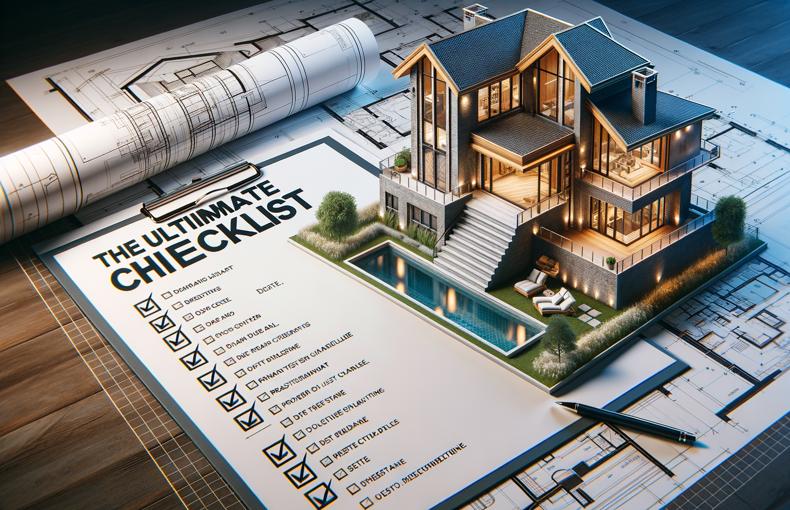The Ultimate Checklist for First-Time Homeowners
Becoming a homeowner for the first time is a significant milestone filled with excitement and responsibility. Navigating this new chapter requires careful planning and consideration to ensure a smooth transition and successful homeownership. This ultimate checklist will guide first-time homeowners through every essential step, from the initial search to settling into their new home.
1. Financial Preparation
Assess Your Finances
- Credit Score: Check your credit score and improve it if necessary. A higher score can secure better mortgage rates.
- Budget: Determine a realistic budget considering all potential costs, including down payment, closing costs, and ongoing expenses.
- Savings: Ensure you have enough savings for the down payment, typically 20% of the home's price, and additional funds for emergencies.
Mortgage Pre-Approval
- Research Lenders: Compare mortgage lenders and get pre-approved to understand how much you can borrow.
- Loan Types: Learn about different loan options (fixed-rate, adjustable-rate, FHA, VA) to find the best fit for your situation.
2. Home Search
Define Your Needs and Wants
- Location: Choose a location based on proximity to work, schools, amenities, and safety.
- Home Features: List must-haves and nice-to-haves, such as the number of bedrooms, bathrooms, yard size, and special features.
Engage a Real Estate Agent
- Expert Guidance: A real estate agent can provide valuable insights, negotiate on your behalf, and streamline the home-buying process.
- Property Tours: Schedule tours and open houses to get a feel for different homes and neighborhoods.
3. Home Inspection and Appraisal
Home Inspection
- Hire a Professional: A licensed home inspector will identify any structural issues, necessary repairs, or potential problems.
- Inspection Report: Review the report carefully and consider negotiating repairs or price adjustments based on findings.
Appraisal
- Fair Market Value: An appraisal ensures the home's price aligns with its market value, protecting you and your lender from overpaying.
4. Making an Offer
Crafting an Offer
- Competitive Pricing: Base your offer on market research and your budget.
- Contingencies: Include contingencies for inspection, appraisal, and financing to protect your interests.
Negotiation
- Counteroffers: Be prepared for counteroffers and work with your real estate agent to reach an agreement.
5. Closing Process
Final Walkthrough
- Last Check: Conduct a final walkthrough to ensure the property is in agreed-upon condition before closing.
Closing Costs
- Understand Fees: Closing costs can include loan origination fees, title insurance, escrow fees, and more. Budget for these expenses.
Signing Documents
- Legal Process: Review and sign all necessary documents, including the mortgage agreement, title deed, and closing disclosure.
6. Moving In
Moving Plan
- Hire Movers or DIY: Decide whether to hire professional movers or do it yourself.
- Packing: Organize and pack belongings efficiently, labeling boxes by room.
Setting Up Utilities
- Transfer Services: Arrange for the transfer or setup of utilities such as electricity, water, gas, internet, and cable.
Security Measures
- Change Locks: Change the locks on all exterior doors for added security.
- Install Alarms: Consider installing a security system or upgrading existing security features.
7. Settling In
Home Maintenance
- Routine Checks: Establish a maintenance schedule for HVAC systems, plumbing, and electrical systems.
- Seasonal Tasks: Prepare for seasonal tasks like gutter cleaning, lawn care, and winterizing.
Personalizing Your Space
- Interior Decor: Begin decorating and furnishing your new home to reflect your style and comfort.
- Outdoor Spaces: Consider landscaping, gardening, and creating outdoor living areas.
8. Understanding Homeownership Responsibilities
Financial Management
- Mortgage Payments: Set up automatic mortgage payments to avoid missing due dates.
- Insurance: Ensure homeowners insurance covers potential risks and review it annually.
Community Involvement
- Neighborhood Association: Engage with local associations or community groups to stay informed and connected.
- Local Services: Familiarize yourself with local services, such as emergency contacts, schools, and healthcare providers.
Additional Resources
Online Tools and Apps
- Budgeting Apps: Use budgeting apps like Mint or YNAB to manage your finances effectively.
- Home Maintenance Apps: Apps like HomeZada can help you keep track of home maintenance tasks and schedules.
Educational Materials
- Books: Read books like "The First-Time Homeowner's Handbook" by Amy Matthews for detailed guidance.
- Websites: Explore websites like Zillow, Realtor.com, and local government sites for additional information and resources.
Conclusion
Becoming a homeowner for the first time is a journey that requires thorough preparation and careful planning. By following this ultimate checklist, first-time homeowners can navigate the process with confidence, ensuring a successful and enjoyable homeownership experience. Remember, taking the time to plan and understand each step will pave the way for a smooth transition into your new home and the fulfillment of your homeownership dreams.











